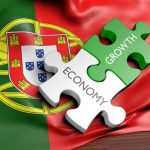Portugal’s general election winner’s three priorities: speed up licensing, cut red tape and review public procurement procedures
Portugal’s Minister of the Economy, Pedro Reis, underscored three vital policy priorities for the country’s economy on Friday for whichever party won the country’s general election on may 18: speeding up licensing, cutting red tape and reviewing public purchasing procedures.
Text: Chris Graeme; Photo: Fernando Bento
The minister was addressing business leaders at a lunch organised by the International Club of Portugal (ICPT) at the Sheraton Hotel & Spa on the ‘Challenges of the Portuguese Economy within the current international context’
Pedro Reis said it was time to “take stock about the prospects and perspectives for Portugal’s economy” and this had to be done bearing in mind the situation the government faced on taking power one year ago, what it had done up until now, and look forward to what there was still to be done.
The government believed in an economy that was “less dependent on government, a stronger middle class, and a more active social elevator” – and for this Portugal’s public administration needed staff that were better qualified – and believed in combatting “excess red tape and cutting taxes, a more transparent market with stronger competition”.
“We strongly believe in the importance of the private sector for the success of our economy and that through the creation of wealth we’ll create a fairer society,” said the minister, adding that the ministries of the Economy and Finances had been working to bring young talent to Portugal from overseas because it was concerned about the country’s future.
“From the get-go this government focused on urgent action seeking the courage within the space of time we had by valuing strategic public-private partnerships while not forgetting social justice,” he said.
Pedro Reis, a former President of Portugal’s overseas investment bureau AICEP – he recently appointed its new director, Ricardo Arroja – , said that today Portugal was seen as a “safe haven and strategic platform for investors”.
“It’s not by accident that we have our sovereign debt below 60%, our public debt at 95% (15 years ago it had been running at 120%) and have a budget surplus”, he said – Portugal’s Public Administration (AP) in January 2025 posted a positive overall balance of €1.672,1Bn, which represented an increase of €461.9 million compared to the same period,” according to the country’s Directorate-General of the Budget (DGO).
Seated next to Portugal’s Minister of Finances, Joaquim Miranda Sarmento and near members of the Economists Association, Pedro Reis said that he would be rather seen as the “Minister for Companies rather than the Economy”, and stressed that the “economy is is not all macro and reports; it was about actions, follow through and decisions and “deep diving” into policies to make Portugal’s “economy and companies competitive”.
He said that a new economic matrix was unfolding in the country where the government’s main role was to create the right environment for economic growth and business prosperity by alleviating the tax burden and red tape strangling companies.
Stepping up on defence
The minister added that one day the advantages of the ministries of the Economy and Finances working hand-in-glove together for companies would be evident.
On the question of defence, Pedro Reis said that a selection of all the companies capable of joining the military-industrial complex had been made, adding that a steering committee had been set up to work with them.
European NATO members have realised that they can no longer count on the United States to subsidise the continent’s defence and have to stump up billions for European defence with resulting opportunities for European companies that can successfully adapt to armaments production.
Moreover, Pedro Reis said that the government was working on “compiling European and Portuguese financial instruments to help the (military-industrial) sector and admitted to creating partnerships with those countries disposed to doing so.
The minister also emphasised the need to change the European agenda in the sense that companies that gained scale lost incentives and suggested that this needed to change.
Fast-tracking PPPs and Public Procurement
In fact, Pedro Reis said that the government was designing an international network for investment partnerships while also adding that it was important to be humble enough to understand what companies had been asking for and said that it already had a programme to unlock State-backed guarantees for companies involved in Portugal’s Recovery and Resilience Plan (RRP) which is financed by European loaned funds and grants.
On the issue of public contracts, Pedro Reis said that public accounts processes needed to be reviewed to become more aligned with contract criteria.
The compilation of these financial instruments could be done through Portugal’s development bank, the Banco de Fomento, using the funds in these instruments to support this military-industrial complex as well as fast-track public purchasing.
In February, the government made a clean sweep of board members at the development bank with a new board led by a new president, José Regalado (Also at the lunch) and Carlos Leiria Pinto as the president of the non-executive board to strengthen governance, compliance and best practices after the previous board had complained it had been “hamstrung by State inefficiency and delays on its restructuring by the ministries of Finance and Economy”.
Pedro Reis said that Portugal had opportunities in industry, namely in the areas of components, operation platforms, satellites, space software and military uniforms.
He said that it wasn’t possible to invest more without unblocking the trust in the public administration, adding that there was a lot to do in terms of reducing bureaucracy and streamlining the institutional architecture.
Better salaries means better productivity
The minister also highlighted the importance of encouraging a good average salary and admitted that if Portugal wanted to stem the tide of young graduates leaving the country looking for better wages and opportunities overseas, then its companies had to pay better salaries.
“At the level of social, trade unions and business associations we’ve argued for better average salaries, the lack of which had really been a drag on the Portuguese economy. Portugal has to move in the arena of professional qualifications and to attract those that have them, we have to pay them better without exception, and in return we’ll get more productivity, more commitment, and more professionalism.”
The minister explained that when it sought to give incentives to SMEs that performed in terms of social pacts, it also meant that the State should not be “hamstringing people who were doing well from their own efforts, initiative, entrepreneurialism and risk taking”.
“We have to allow room to our companies, our entrepreneurs and investors and employees to generate wealth in order to give back to society, and not strangle them to the point where they can’t breathe”, he said alluding to bureaucracy and high taxation.
The elections – creating clarity
On the upcoming general election on March 18, the Ministry of the Economy said he hoped the results would be clear cut and clarify which of the two main parties – PS Socialist Party or PSD Social Democratic Party, the public had most faith in.
He said that only a clear cut result would allow the winning party to press ahead with a top-down strategy to stimulate the economic growth that was so necessary for Portugal’s economy. “What does clarification mean? Depth of strategy” he said.
However, Pedro Reis admitted that Portugal was divided between parties that were “reformists and opportunists”.
“We have May 18 scheduled for the elections, so let’s take advantage of May 18. It means whether a clear-but solution will emerge in politics so that politics can focus on the economy. It’s what the Portuguese expect, companies want and overseas observers are looking at”, he concluded.










